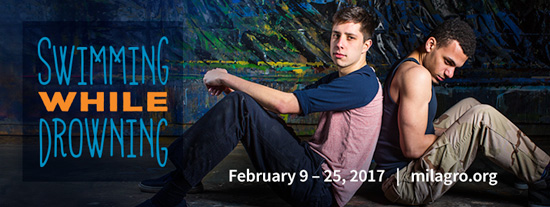
In Swimming While Drowning, playwright Emilio Rodriguez intertwines the everyday language of teenagers with heightened poetry to capture the world of two young men in an LGBT homeless shelter. Francisco Garcia, who was handpicked to direct this play by executive director Jose Gonzalez, brings an experience of creating theatre about young people’s issues to his work on Swimming While Drowning. Additionally, he brings his experience of living in Los Angeles, where the play is set. There, he often worked with youth similar to the characters in Swimming While Drowning. His passion for giving a voice to underserved youth becomes apparent as he takes some time between rehearsals at Milagro to share his thoughts on the world premiere of Swimming While Drowning:
What first stood out to you about this play?
“This play, is going to be unlike anything that is currently playing right now in Portland and it’s exciting to help bring it to life with the world premiere.
With the current political climate, I think we are going to see a resurgence in theatre of plays with social change content, dealing with communities that are underserved and underrepresented in mainstream media whether its people of color, the LGBTQ community, or impoverished youth… this is the time when we need to get the voices of these communities heard.”

What is it like working with two young actors?
“When Blake and Mitchel came in to audition, things just clicked.
It’s very believable that these two are playing teenagers and these actors are just so good. They have so much experience for how young they are and every time they come into the rehearsal room they give it their all. Plus they’ve worked together previously so there’s a comradery between the two of them. They are genuinely excited whenever they come to rehearsal to have this opportunity to do this play together.”
What was it like having the playwright in the room for the first week of rehearsal?
“Having Emilio there was really helpful. We were able to flesh out some things that weren’t clear and the actors loved being able to pick the playwrights brain about the meaning behind certain moments. This play has constantly been developing for the better throughout the whole process and gotten increasingly stronger. I’m just so excited to be able to share it with people”
Why is this play important for Portland, OR?
“We have a very serious issue of homelessness in this city, particularly with youth, teenagers that are living in poverty and teenagers in the foster care system either through issues that have been going on in their house or because of not feeling like they belong because of how they identity. I work with youth all the time, and it goes back to seeing yourself represented on stage, we’re not seeing teenage characters that identify as LGBTQ and the real struggles that they go through, so being able to give a voice to those types of characters, that’s important. And the hope is that when the show is done, this will be something you talk about. Maybe this is a community you knew nothing about, that you want to learn more about or that you feel that you want to help support.
I’m excited to see the life this play has outside of this production. This is the type of play that I’d like to see in other communities to give voice to underserved or marginalized youth. It’s been awesome to say that we helped launch this show.”

What is your background with Milagro?
“I started out at Milagro as an intern when I was in college, back in 2000. I did a whole gamut of things from acting to concessions to helping back stage. It was my first time working at a theatre, outside of the university setting, and it taught me a lot. That summer after I graduated, Dañel Malán hired me to tour with the company. Then, after I was done touring I acted around town in Portland and my last role before I moved away was the title character in Tino Does Time at Milagro. At the time, I felt like I was coming full circle. Then I lived in LA for 10 years and worked as a playwright, director educator and actor. Now, since I’ve moved back two years ago I was asked to direct Broken Promises written by Olga Sanchez and now I am directing a show in the mainstage season. So now I truly feel that I’ve come full circle here and it has been really special. As an actor of color, particularly a Latino, there are very few plays that get produced in Portland by Latino writers. The fact that Milagro has been here for so long, and providing artists like myself the opportunity to grow is the ideal situation, especially for a theatre that gives voices to people of color.”
Do you have a Favorite line from the play?
“If you were drowning, would you keep drowning or would you try to swim?”
“I think this type of a play is so important; it shows these characters who are able to empower themselves and keep their heads above the water.”
If you could choose a color to represent Swimming While Drowning, which would you choose?
“Aqua. Blue can be cold or warm, it can have happiness and sadness, there’s so many meanings in it.

